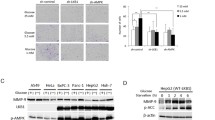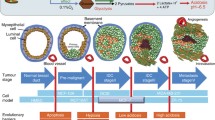Abstract
The metabolic microenvironment of solid tumours is often dominated by extracellular acidosis which results from glycolytic metabolism. Acidosis can modulate gene expression and foster the malignant progression. The aim of the study was to analyse the effects of extracellular acidosis on the mTOR signalling pathway, an important regulator of anabolic and catabolic processes like cell proliferation and autophagy. The study was performed in two tumour cell lines, AT-1 prostate and Walker-256 mammary carcinoma cells. Cells were incubated at pH 7.4 or 6.6 for 3 h and 24 h. Then RNA and protein were extracted and analysed by qPCR and western blot. mTOR and P70-S6 kinase (P70-S6K), an important downstream target of mTOR, as well as the autophagic flux were studied. The effect of acidosis on P70S6K phosphorylation was compared to pharmacological mTOR inhibition with LY294002 and rapamycin. In both cell lines the total mTOR expression was not altered by acidosis, however, the mTOR phosphorylation was reduced after 3 h but not after 24 h. The P70S6K phosphorylation was reduced at both time points comparable to changes by pharmacological mTOR inhibitors. The autophagic flux, also a target of mTOR and measured by LC3-II expression, was increased in both cell lines after 24 h of acidosis. The results of this study indicate that mTOR signalling is inhibited by extracellular acidosis which then lead to a reduced activity of the P70-S6 kinase (modulating gene expression) and increased autophagy possibly mediated by ULK1/2 activity. These finding may offer new perspectives for therapeutic interventions in acidic tumours.
Access this chapter
Tax calculation will be finalised at checkout
Purchases are for personal use only
Similar content being viewed by others
References
Corbet C, Feron O (2017) Tumour acidosis: from the passenger to the driver’s seat. Nat Rev Cancer 17(10):577–593. https://doi.org/10.1038/nrc.2017.77
Thews O, Riemann A (2019) Tumor pH and metastasis: a malignant process beyond hypoxia. Cancer Metastasis Rev 38(1–2):113–129. https://doi.org/10.1007/s10555-018-09777-y
Vander Heiden MG, Cantley LC, Thompson CB (2009) Understanding the Warburg effect: the metabolic requirements of cell proliferation. Science 324(5930):1029–1033. https://doi.org/10.1126/science.1160809
Vaupel P, Kallinowski F, Okunieff P (1989) Blood flow, oxygen and nutrient supply, and metabolic microenvironment of human tumors: a review. Am Assoc Cancer Res 49(23):6449–6465
Laplante M, Sabatini DM (2009) mTOR signaling at a glance. J Cell Sci 122(Pt 20):3589–3594. https://doi.org/10.1242/jcs.051011
Balgi AD, Diering GH, Donohue E, Lam KKY, Fonseca BD, Zimmerman C, Numata M, Roberge M (2011) Regulation of mTORC1 by pH. PLoS One 6(6):e21549. https://doi.org/10.1371/journal.pone.0021549.g001
Riemann A, Schneider B, Ihling A, Nowak M, Sauvant C, Thews O, Gekle M (2011) Acidic environment leads to ROS-induced MAPK signaling in cancer cells. PLoS One 6(7):e22445. https://doi.org/10.1371/journal.pone.0022445
Dossou AS, Basu A (2019) The emerging roles of mTORC1 in macromanaging autophagy. Cancers (Basel) 11(10). https://doi.org/10.3390/cancers11101422
Mizushima N, Yoshimori T (2007) How to interpret LC3 immunoblotting. Autophagy 3(6):542–545. https://doi.org/10.4161/auto.4600
Yun CW, Lee SH (2018) The roles of autophagy in cancer. Int J Mol Sci 19(11). https://doi.org/10.3390/ijms19113466
Acknowledgments
The study was supported by the HaPKoM program of the Medical Faculty, University of Halle (PK40) and the Deutsche Forschungsgemeinschaft DFG (grant TH 482/6-1).
Author information
Authors and Affiliations
Corresponding author
Editor information
Editors and Affiliations
Rights and permissions
Copyright information
© 2022 Springer Nature Switzerland AG
About this paper
Cite this paper
Wolff, M., Rauschner, M., Reime, S., Riemann, A., Thews, O. (2022). Role of the mTOR Signalling Pathway During Extracellular Acidosis in Tumour Cells. In: Scholkmann, F., LaManna, J., Wolf, U. (eds) Oxygen Transport to Tissue XLIII. Advances in Experimental Medicine and Biology, vol 1395. Springer, Cham. https://doi.org/10.1007/978-3-031-14190-4_46
Download citation
DOI: https://doi.org/10.1007/978-3-031-14190-4_46
Published:
Publisher Name: Springer, Cham
Print ISBN: 978-3-031-14189-8
Online ISBN: 978-3-031-14190-4
eBook Packages: Biomedical and Life SciencesBiomedical and Life Sciences (R0)




